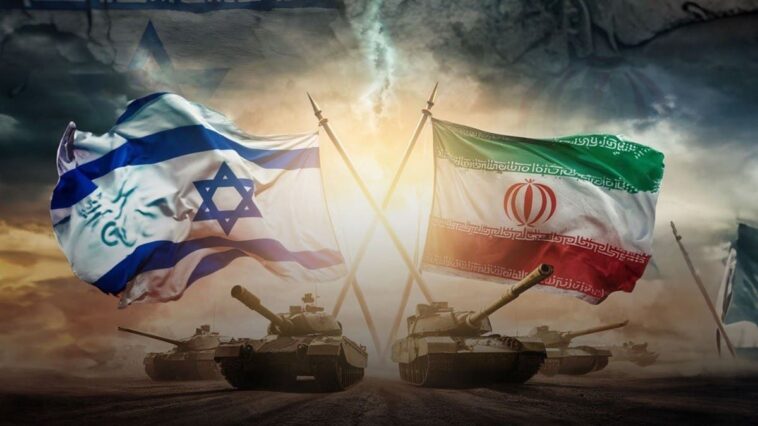Amid an escalating conflict, there’s a growing consideration for the U.S. to intervene directly, as President Trump weighs the merits and demerits of potential military intervention. This reflection comes as the implications of a war initiated by Israel loom overhead, leaving the American populace, weary of previous wars, in a tight spot. An offhand remark by Trump indicated that the supreme leader of Iran could be a ‘soft target,’ which stirred Iran to retaliate with a promise of staunch resistance. By this, the U.S. position seems to have veered off from the prior stance of calculated acceptance, where they offered defensive backing to Israel via sharing military intelligence and coordinating missile defense without participating in offensive operations against Iran.
This measured position looks to have taken a shift in a more severe direction as military reinforcements from the U.S. make their way to the contentious region. Dramatically, Trump departed prematurely from a G7 summit in Canada, citing a need to manage ‘unfolding events in the Middle East’ from Washington. His resistance to support a temporary ceasefire and his insistence on ‘an actual end’ to Iran’s endeavors for nuclear prowess could potentially entrap the U.S. in another Middle Eastern war, an eventuality he has frequently spoken out against in the past.
Israel and Iran had twice previously traded controlled attacks, each instance followed by a pullback to prevent heated conflict from erupting. However, a recent move by Israeli Prime Minister Benjamin Netanyahu to strike Iranian nuclear facilities has unexpectedly pushed the countries into a drastic, war-like confrontation. Disappointingly, this evolving conflict is not confined to the military but has spread to affect civilian lives on both sides. The reluctance on either side to alleviate aggression escalates the situation further.
Defying this cycle of violence demands external intervention, especially from the U.S., to establish boundaries for this escalation and create a conducive environment for diplomatic peace talks to emerge. An unexpected Israeli assault on June 13 severely interrupted Iran’s military command, annihilated substantial military assets, and most importantly, crippled a large part of Iran’s civilian nuclear program. This last point was ostensibly Netanyahu’s justification for initiating a war.
A hidden objective beyond Netanyahu’s expressed reasoning seems to be the creation of an environment conducive for regime change inside Iran or at least the debilitation of the Iranian state. Iran’s response was resolute; despite the success of Israel’s initial offenses, Iran’s armed forces retaliated fiercely. Presently, the situation has turned into a daily barrage of firepower, with the civilian populous in both countries feeling the brunt of it.
Due to Israel’s superior aerial warfare capabilities and missile defense mechanisms, the effectiveness of Iran’s long-range ballistic missiles has been restrained. Still, these have managed to deal considerable damage to Israel’s populous and economic hubs. Currently, both sides seem to be operating under the assumption that causing maximum destruction will compel the opponent’s capitulation, leading to a readiness to endure unimaginable levels of destruction.
Considering the nuclear equation, it presents certain limitations to what Israel can achieve with its military power alone. The Fordow Fuel Enrichment Plant in Iran, tucked away under a formidable rocky mountain, appears impervious to any offensive that Israel can mount. Its destruction would require the use of large, non-nuclear bunker busting bombs, known as the Massive Ordnance Penetrator, that only the U.S. can provide.
Iran has unequivocally stated that should the U.S. intervene, all U.S. bases and forces will become legitimate targets. The U.S., in its effort to maintain Iran’s non-nuclear status, should avoid mobilizing as a pawn in a war intended to instigate regime change in Iran. Instead, the U.S. should lean towards conducting coercive mediation, where any supplementary military or intelligence support hinges on Israeli restraint.
This strategy could extend to opposing further attacks on the Iranian leadership or its civilian infrastructure, tying the continuation of U.S. military aid to Israel’s commitment to limiting its operations to legitimate and immediate threats. President Trump has taken stances against targeting Iran’s supreme leader. A private engagement with Iran to seek a compromise could be the simplest way to challenge this perceived threat.
Peaceful resolution necessitates compromise; that insinuates abandoning an absolutist approach towards Iranian nuclear enrichment. One prospective approach could be to resurrect discussions relating to a multinational enrichment consortium. This method could restrict Iran’s direct access to weapons-grade fissile material while still maintaining its peaceful nuclear capabilities.
If the now raging conflict carries on without a negotiated agreement, Iran might deduce that developing a nuclear weapon is the sole safeguard. Under such strain, Tehran could switch to a mode of heightened opacity, sustaining nuclear ambiguity while rushing towards developing breakout capabilities. The answer to this threat lies not in military action, but diplomatic control supported by verified checks.
Meanwhile, the unceasing conflict has begun adversely affecting Israel on an economic and societal level. Civilians are falling victim to the violence, oil refineries are being hit, and infrastructure is crumbling. The U.S. must apprehend that pursuing a diplomatic resolution does not imply abandoning Israel, but instead protects the reinstatement of normalcy for Israeli civilians.
Primarily, moving towards peace requires the U.S. to categorically rule out the illusion that prolonging the war will ensure a flawless victory. Targeting nuclear scientists for assassination might momentarily stall progress, but the dispersion of their acolytes throughout various institutes means the problem will endure. Recognizing the tragedy of this moment, even if this war were to end abruptly, sustaining diplomacy to keep Iran non-nuclear will still be an uphill battle.




